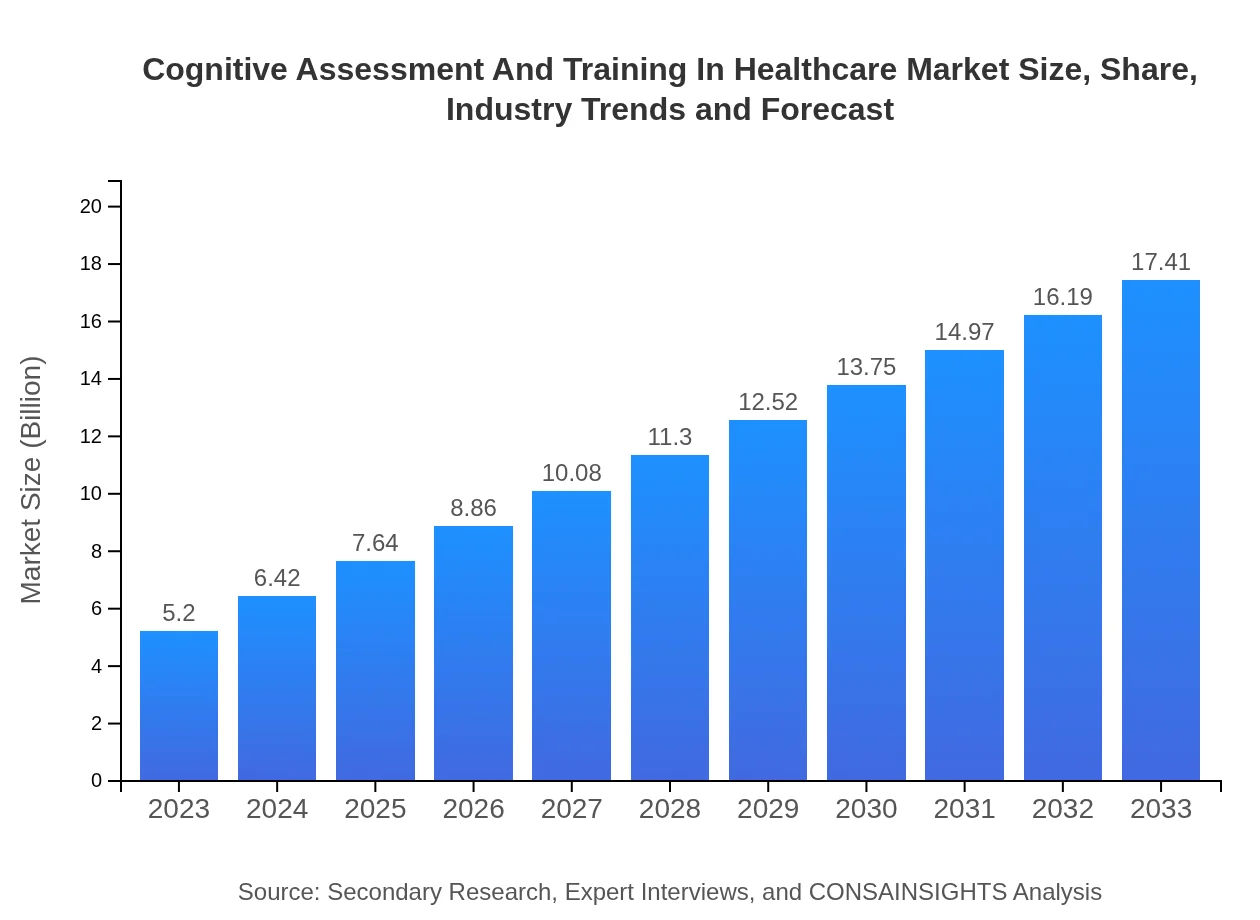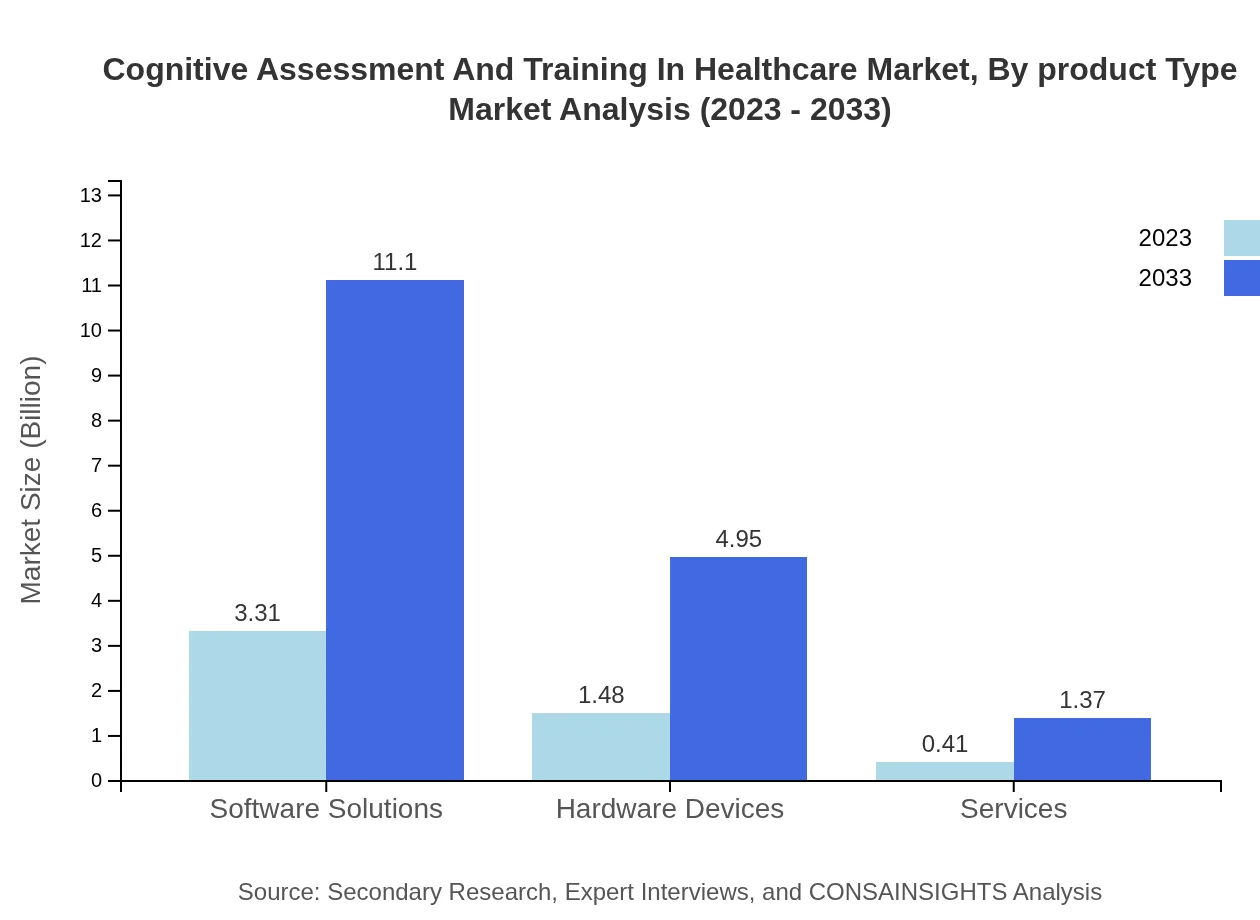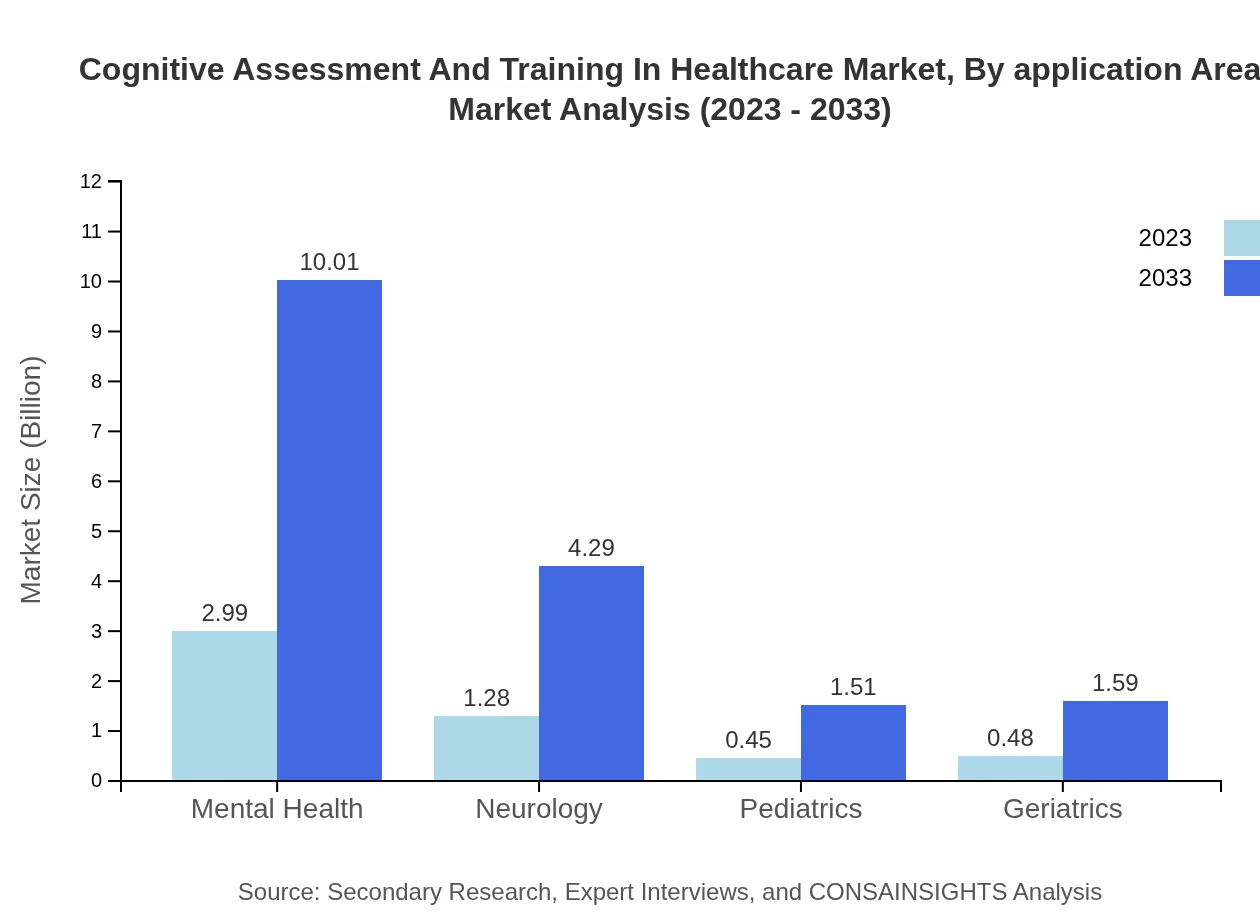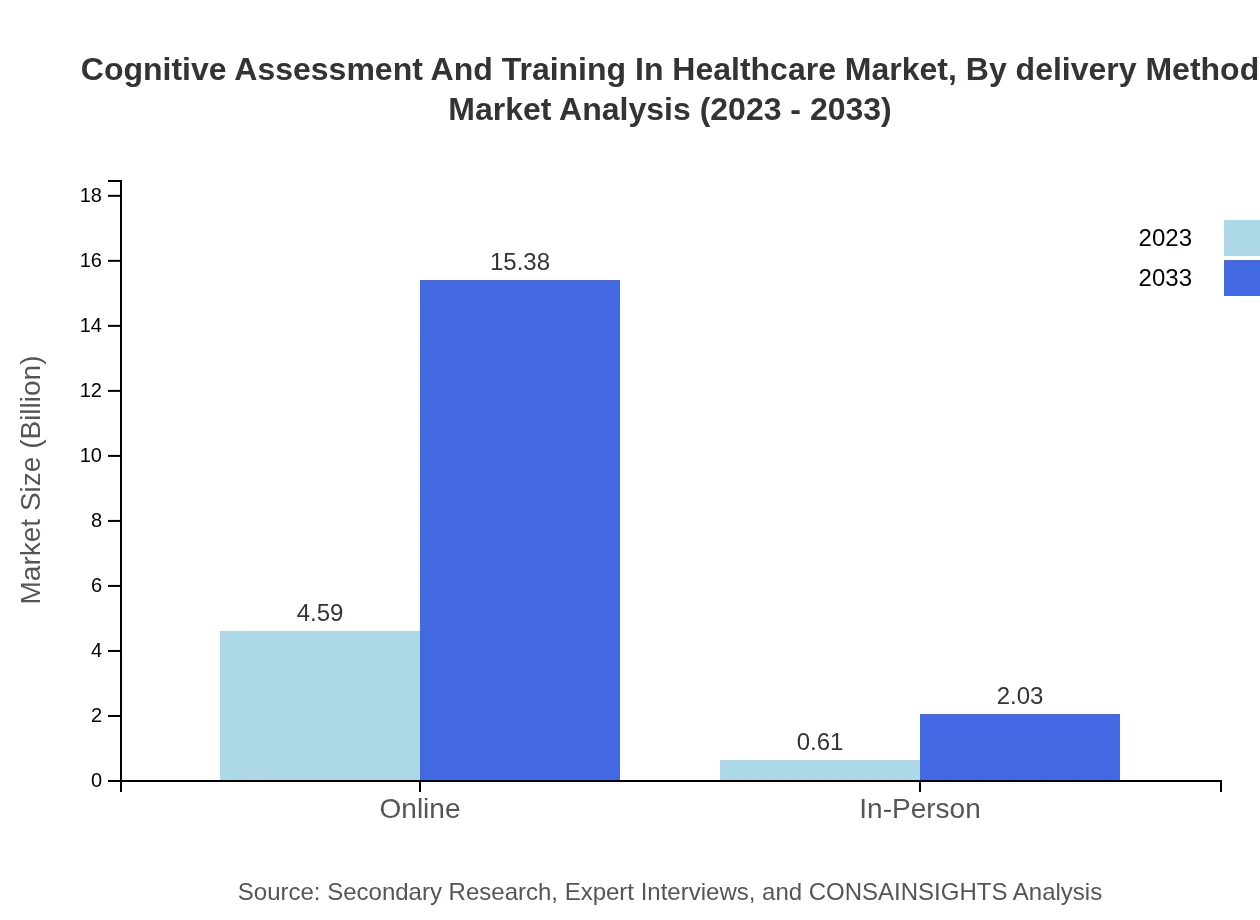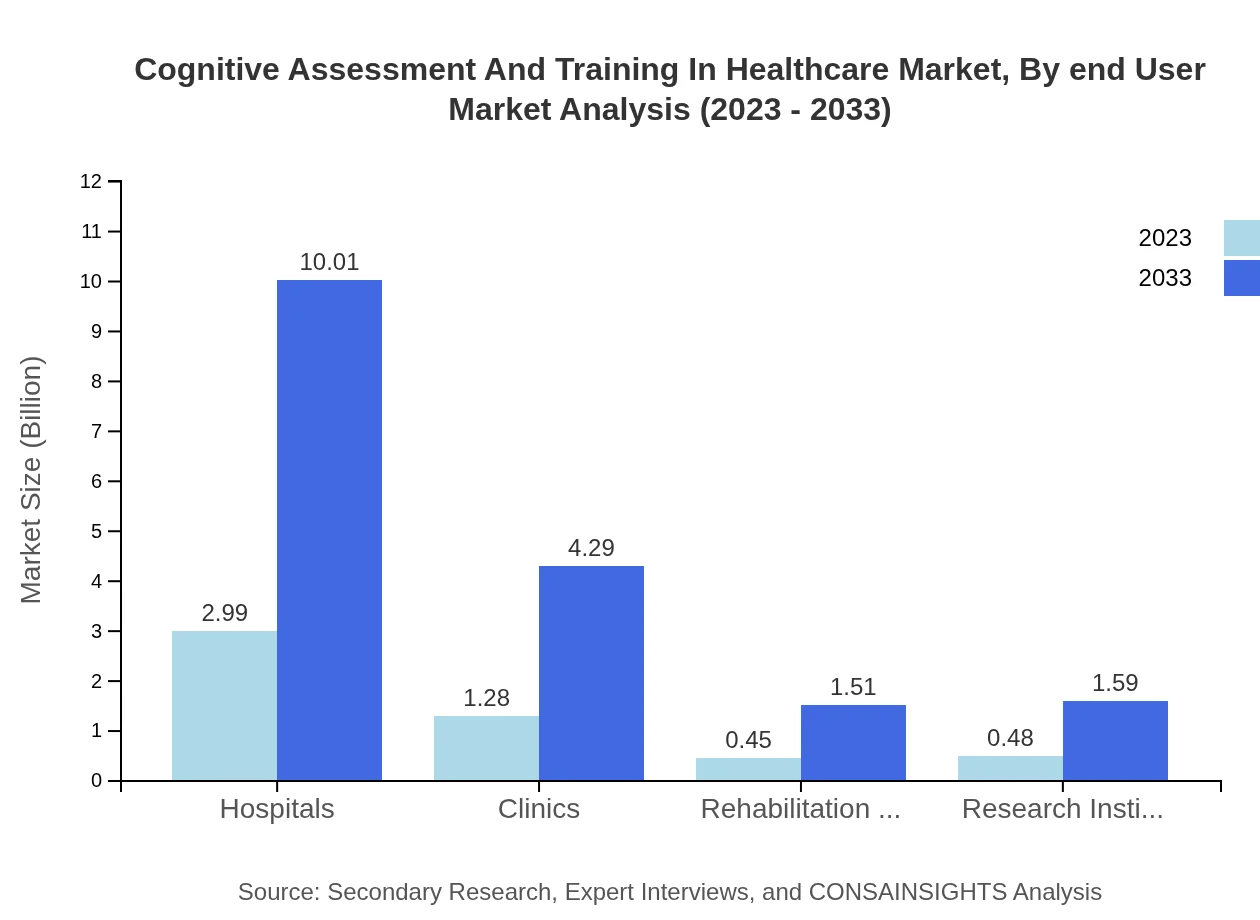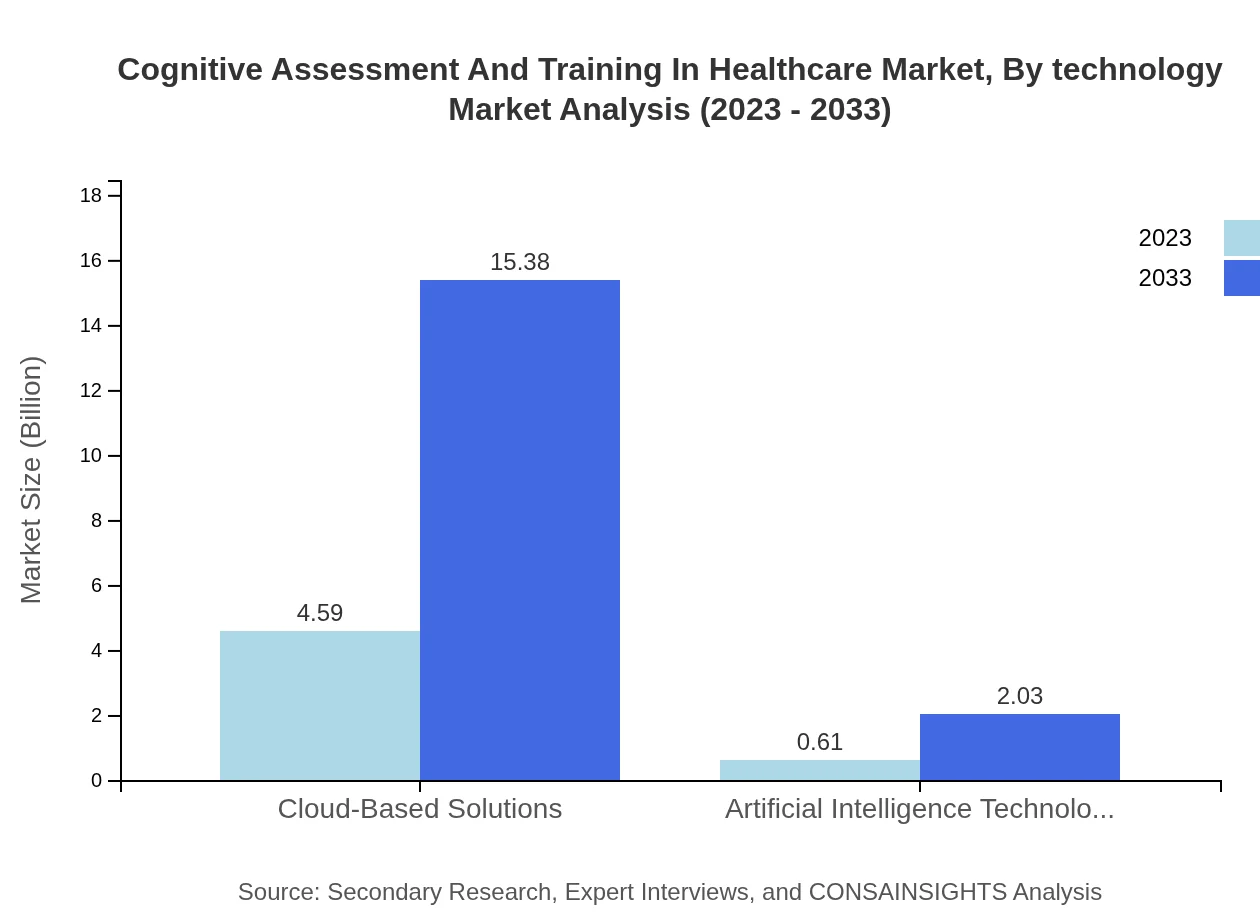Cognitive Assessment And Training In Healthcare Market Report
Published Date: 31 January 2026 | Report Code: cognitive-assessment-and-training-in-healthcare
Cognitive Assessment And Training In Healthcare Market Size, Share, Industry Trends and Forecast to 2033
This report provides an in-depth analysis of the Cognitive Assessment and Training in Healthcare market, covering insights into market size, trends, segmentation, and regional performance from 2023 to 2033.
| Metric | Value |
|---|---|
| Study Period | 2023 - 2033 |
| 2023 Market Size | $5.20 Billion |
| CAGR (2023-2033) | 12.3% |
| 2033 Market Size | $17.41 Billion |
| Top Companies | CogniFit, BrainCheck, Lumosity, Eureka California |
| Last Modified Date | 31 January 2026 |
Cognitive Assessment And Training In Healthcare Market Overview
Customize Cognitive Assessment And Training In Healthcare Market Report market research report
- ✔ Get in-depth analysis of Cognitive Assessment And Training In Healthcare market size, growth, and forecasts.
- ✔ Understand Cognitive Assessment And Training In Healthcare's regional dynamics and industry-specific trends.
- ✔ Identify potential applications, end-user demand, and growth segments in Cognitive Assessment And Training In Healthcare
What is the Market Size & CAGR of Cognitive Assessment And Training In Healthcare market in 2023 and 2033?
Cognitive Assessment And Training In Healthcare Industry Analysis
Cognitive Assessment And Training In Healthcare Market Segmentation and Scope
Tell us your focus area and get a customized research report.
Cognitive Assessment And Training In Healthcare Market Analysis Report by Region
Europe Cognitive Assessment And Training In Healthcare Market Report:
In Europe, the market is expected to grow from $1.80 billion in 2023 to $6.03 billion by 2033. The increasing prevalence of cognitive disorders and ongoing investments in mental health programs are key factors driving this growth.Asia Pacific Cognitive Assessment And Training In Healthcare Market Report:
The Asia Pacific market is projected to grow from $0.97 billion in 2023 to $3.24 billion by 2033. The increasing focus on mental health, along with the adoption of advanced healthcare technologies, is driving the demand for cognitive assessments in this region.North America Cognitive Assessment And Training In Healthcare Market Report:
North America leads the market with a valuation of $1.70 billion in 2023, projected to reach $5.69 billion by 2033. The region's dominance is attributed to high awareness levels, significant investments in healthcare technology, and a well-established healthcare infrastructure.South America Cognitive Assessment And Training In Healthcare Market Report:
In South America, the market is expected to expand from $0.37 billion in 2023 to $1.25 billion by 2033. Growing awareness of mental health issues coupled with rising healthcare expenditures is anticipated to fuel market growth.Middle East & Africa Cognitive Assessment And Training In Healthcare Market Report:
The Middle East and Africa market is estimated to grow from $0.36 billion in 2023 to $1.20 billion by 2033. The demand for cognitive assessment tools in this region is rising as governments prioritize healthcare improvements and mental health resources.Tell us your focus area and get a customized research report.
Cognitive Assessment And Training In Healthcare Market Analysis By Product Type
The analysis reveals that cloud-based solutions dominate the market owing to their scalability and ease of access, accounting for $4.59 billion in 2023 and projected to grow to $15.38 billion by 2033. Software solutions also represent a significant market share, increasing from $3.31 billion in 2023 to $11.10 billion in 2033, highlighting their essential role in cognitive assessment and training.
Cognitive Assessment And Training In Healthcare Market Analysis By Application Area
By application, mental health is the leading segment, expected to grow from $2.99 billion in 2023 to $10.01 billion by 2033, maintaining a market share of 57.53% throughout the period. Additionally, neurology applications are set to expand significantly, reflecting a greater recognition of cognitive health's importance in neurology.
Cognitive Assessment And Training In Healthcare Market Analysis By Delivery Method
Online delivery methods are expected to maintain dominance, expanding from $4.59 billion in 2023 to $15.38 billion by 2033, driven by the growing trend towards remote health services. In-person assessments, while smaller in scale, are projected to grow steadily from $0.61 billion to $2.03 billion during the same period.
Cognitive Assessment And Training In Healthcare Market Analysis By End User
Hospitals remain the primary end-user segment, commanding $2.99 billion in 2023 and expected to reach $10.01 billion by 2033. This dominance is attributed to the extensive use of cognitive assessment tools in clinical settings, which underscores the critical link between cognitive health and overall patient care.
Cognitive Assessment And Training In Healthcare Market Analysis By Technology
The technology segment is rapidly evolving, particularly concerning artificial intelligence applications which are expected to triple from $0.61 billion in 2023 to $2.03 billion by 2033. The integration of these technologies not only enhances cognitive training methodologies but also ensures personalized care pathways for patients.
Cognitive Assessment And Training In Healthcare Market Trends and Future Forecast
Tell us your focus area and get a customized research report.
Global Market Leaders and Top Companies in Cognitive Assessment And Training In Healthcare Industry
CogniFit:
CogniFit offers innovative cognitive assessment tools designed to personalize cognitive training programs, supporting healthcare providers in improving patient cognitive outcomes.BrainCheck:
BrainCheck specializes in digital assessments for cognitive health, providing real-time data to facilitate healthcare providers in monitoring and evaluating patients' cognitive functions.Lumosity:
Lumosity combines neuroscience with mobile technology to offer cognitive training games, enhancing engagement while providing valuable assessment data for healthcare applications.Eureka California:
Eureka California focuses on developing cognitive training software for rehabilitation centers, contributing significantly to cognitive recovery initiatives.We're grateful to work with incredible clients.









FAQs
What is the market size of cognitive Assessment And Training In Healthcare?
The global cognitive assessment and training in healthcare market is currently valued at approximately $5.2 billion, with a projected compound annual growth rate (CAGR) of 12.3% through 2033, indicating significant expansion opportunities in the upcoming years.
What are the key market players or companies in this cognitive Assessment And Training In Healthcare industry?
Key market players in the cognitive assessment and training in healthcare industry include companies specializing in software solutions, artificial intelligence technologies, and rehabilitation services, which are essential for cognitive health advancements.
What are the primary factors driving the growth in the cognitive Assessment And Training In Healthcare industry?
The growth drivers include the increasing prevalence of cognitive disorders, advancements in technology, growing aging populations, and the rising demand for personalized healthcare solutions, all contributing to the industry's dynamic expansion.
Which region is the fastest Growing in the cognitive Assessment And Training In Healthcare?
Europe is expected to be the fastest-growing region, expanding from $1.80 billion in 2023 to $6.03 billion by 2033, reflecting a robust demand for cognitive services and diagnostics.
Does ConsaInsights provide customized market report data for the cognitive Assessment And Training In Healthcare industry?
Yes, ConsaInsights offers customized market reports tailored to specific needs, ensuring relevant insights and data catered to the cognitive assessment and training market dynamics.
What deliverables can I expect from this cognitive Assessment And Training In Healthcare market research project?
Deliverables typically include comprehensive market insights, trend analyses, competitive landscapes, regional evaluations, and segment data, providing stakeholders with actionable intelligence for strategic planning.
What are the market trends of cognitive Assessment And Training In Healthcare?
Current trends include increasing integration of AI and cloud-based solutions, a shift towards online training methodologies, and greater emphasis on mental health and personalized approaches in cognitive healthcare.

